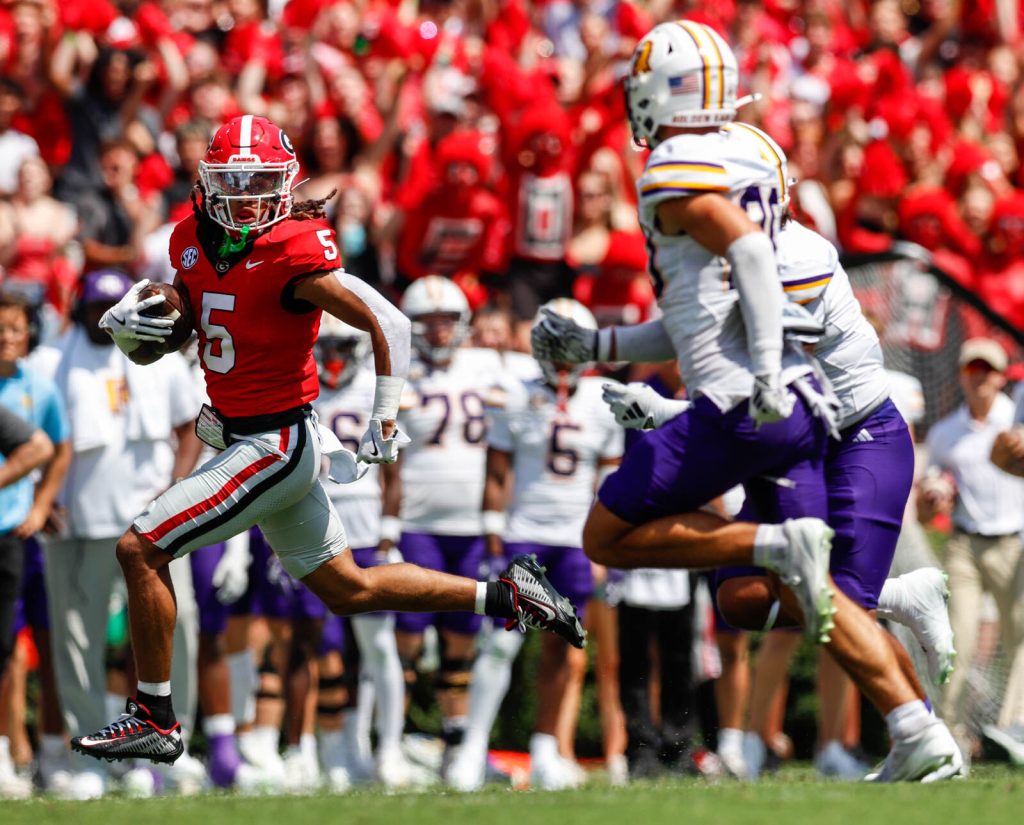Link to Article on The Red & Black
Olivia Sayer

Georgia wide receiver Anthony Evans III (5) runs with the ball during the University of Georgia vs. Tennessee Tech game at Sanford Stadium in Athens, Georgia, on Saturday, Sept. 7, 2024. No. 1 Georgia defeated Tennessee Tech 48-3. (Photo/Laney Martin; @LaneyMartinPhotography)
Each year, college football’s elitists pay smaller schools a large sum of money to visit their stadiums. And each year, these smaller schools agree, despite often getting blown out by the more well-known team.
So, why do schools agree to participate in a glorified scrimmage for larger teams, and in turn, why do larger universities pay so much money for them to do so? The answer lies in the ever-changing business side of collegiate athletics.
“Guarantee games” are matchups with no return date that involve a large school paying a small school to play it. On Saturday, Georgia will be paying the University of Massachusetts $1.9 million to face it at 12:45 p.m. in Sanford Stadium. This comes after the Bulldogs paid Tennessee Tech over a half a million dollars earlier in the season.
Funding the department
The primary reason smaller schools engage in these transactions is simple — they need them in order to fund their athletic departments.
There will be over 60 guarantee games played between FBS teams in 2024, according to the Associated Press. These games will have a payout of roughly $75 million.
In Week 1 alone, Alabama, Michigan, Texas and South Carolina all participated in guarantee games, dishing out over $7 million to smaller schools. Western Kentucky, who earned almost $2 million with a 63-point loss to the Crimson Tide, generated just $15 million during the fiscal year 2023 before subsidies from the university.
“If we didn’t play this game, and our football budget had $1.9 million less, our program would look very different,” Western Kentucky athletic director Todd Stewart told Front Office Sports.
Although it is not the driving factor, playing in guarantee games also gives under-the-radar players a chance to be seen. UMass came to Sanford Stadium in 2018 as a part of a deal that gave it $1.5 million to play the Bulldogs. Despite leaving with a 66-27 loss, UMass wideout Andy Isabella set a record for catches by an opponent at Sanford Stadium with 15 for 219 yards and two touchdowns. The Arizona Cardinals later drafted him in the 2019 NFL Draft.
“It’s the reason he gets drafted in the second round,” UMass athletic director Ryan Bamford told The Boston Globe. “He burned three [defensive] backs who went in the first three rounds.”
Still making money
Despite cutting checks with multiple zeros on them, larger universities actually generate revenue from guarantee games. The matchup gives the schools another home game, which brings in money through alternative channels.
Beginning in 2025, the cost of a Georgia football season ticket will be $560, which evens out to $80 per game. This is on-top of a donation required to even earn the right to purchase season tickets.
Guarantee games allow bigger schools to earn additional season ticket money, due to the added home game, along with profiting from parking, concessions and merchandising sales. It also allows the university to sell more advertisements or charge more for them due to the additional viewing time a home game creates.
Hosting a guarantee game also gives teams a better chance at reaching the six-win threshold required for becoming bowl eligible. In the newly expanded 12-team playoff format, it gives most teams — with exceptions such as Notre Dame, which paid Northern Illinois $1.4 million to beat it — an easy win.
Georgia will begin its 2025 season with a guarantee game against Marshall, who replaced UCLA on its schedule after the expansion of multiple conferences. Georgia will pay Marshall $1.7 million, as the two FBS teams keep the business of college football alive.